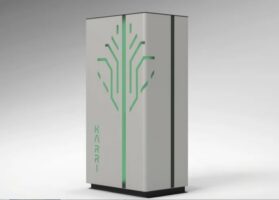Federal energy minister Chris Bowen is doubling down on his commitment to reaching 82 per cent renewables by 2030, saying an accelerated transition to green energy is essential to cut emissions, prices and to keep the lights on.
In a speech to Future Energy Week conference in Adelaide on Wednesday, Bowen also hinted at new policy initiatives to “amplify” the road to the 82 per cent renewable target, and rejected the push for nuclear saying it would be too slow to replace the country’s ageing and increasingly unreliable coal generators.
“Those calling for extensions ignore that increasing coal outages are the core risk to reliability,” Bowen said.
”Replacing them with cleaner, more reliable sources of energy needs to be an urgent priority to keep the lights on.”
Bowen compared the federal Coalition’s calls for coal plants to be kept open in the wait for nuclear small modular reactors to transport planners in the 1960s betting on jet suits and flying cars.
“Experts have put a timeline of the 2040s – at best – that we would see the technology in operation in Australia,” he said.
”The inescapable conclusion of the Liberal plan is that it relies on extending high-polluting, uneconomic and unreliable coal plants through the 2030s to fill the gap until nuclear supposedly arrives.
”This would be both at a significant cost to the taxpayer, and as the AER (Australian Energy Regulator) confirmed at Senate Estimates last month, an ongoing threat to the reliability of our energy grid.”
The federal government’s 82 per cent renewable target by 2030 – based on the Australian Energy Market Operator’s modelling in its Integrated System Plan, is looking increasingly difficult to reach given the slow down in new projects, financing, connections and commissionings.
Bowen’s office declined to say more about which of the current policy suite would be “amplified” to help reach the target, but there has been widespread support for an extended renewable energy target, pushing it out to 2040, and even targets specifically geared to storage, or a combination of the two.
Bowen pointed to the success of South Australia – which has already reached more than 71 per cent renewables (average over the last 12 months), has no coal generation, and a highly reliable grid and is now embarking on attracting new green industries underpinned by the opportunities of green hydrogen.
“South Australia is leading the way when it comes to championing the energy transition,” Bowen said.
“A properly constructed renewable grid is a more reliable and secure grid. It was only in 2016 when SA was at the centre of the climate culture wars.
”The then Federal Government jumped to blame renewables for the statewide blackout – rather than the once-in-fifty-year storm, 80,000 lightning strikes which accompanied it and systemic failures in our governance systems.
”Failures which the SA government, working with other states and now in partnership with the Albanese Government, have worked hard to address.”
Bowen said reliability issues have grown in the eastern states as they struggling ageing and increasingly uncompetitive coal plants that are reaching the end of their technical life.
”In 2022, Australia’s coal power fleet suffered thousands of hours of forced outages, leaving the grid short of forecast coal generation capacity for nearly one-quarter of the year,” he said.
”Expert analysis of coal plant performance finds that the units are collectively unavailable for a much longer period (or volume of energy) than was the case several years ago.
”This isn’t a political view, it’s a practical reality.”
Bowen quoted the head of both the market regulator and the Australian Energy Market Operator, which has noted that the reliability risks of the coming decade can be met through projects that will be built through programs such as the new capacity investment scheme.
”This reinforces the urgency of the transition to renewables,” Bowen said.
”The importance of our plan to get to 82 per cent – for affordability. For cleaner energy. And for reliability.”
And he noted that Australia’s abundance resources of wind and solar are particularly important given the geopolitical ructions, such as Russia’s invasion of Ukraine, that had had deep impacts on global supply chains and energy security.
“We have seen how this European energy supply crisis has cascaded across the world, highlighting the flaws in energy security reliant on concentrated fossil fuel supply chains,” Bowen said.
”By contrast, renewable energy has in-built security advantages. There’s no geopolitical crisis that can stop the sun shining or the wind blowing.
And I’d argue there’s no nation better set up to take advantage of this than Australia.
”Of course, a reliable renewable system must be buttressed with robust storage, transmission and where possible, sovereign domestic manufacturing of key elements of the renewable supply chain – that’s exactly what our policies are designed to achieve.
“The fact is – reducing reliance on and exposure to international fossil fuel headwinds is good for domestic energy security, and our plans to transform our energy grid to 82 per cent renewable energy is essential for both this, and energy reliability.”







